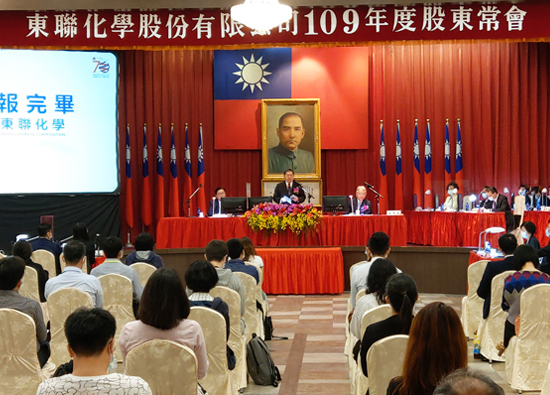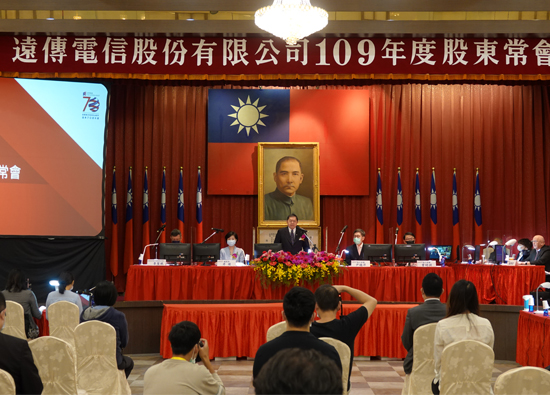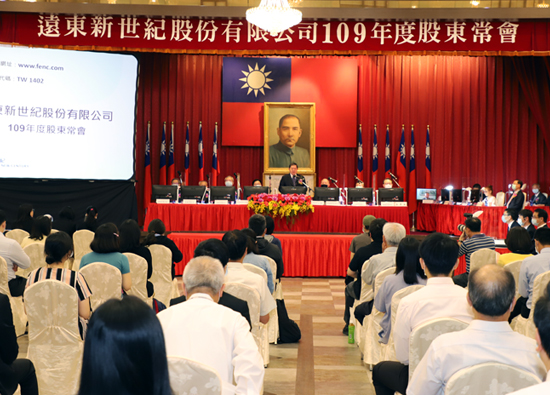08.2020 Group Briefing
2020 General Shareholders’ Meeting of U-Ming
U-Ming Marine / Hannah Huang

.jpg)
Digital Transformation, Sustainable Operations and Prudent Strategy Sailing towards The Next New Wave!
U-Ming Marine Transport Corporation held its 2020 Annual Shareholders’ Meeting (AGM) at the Taipei Hero House on 9 June 2020. The meeting was hosted by U-Ming Chairman, Mr Douglas Hsu who presented the group’s financial statements and announced an earnings distribution for 2019.
Mr Hsu noted that the company’s consolidated revenue was NT$10.068 billion; with net profit of NT$1.622 billion and the earnings per share (after-tax) of NT$1.92.
A motion to award shareholders with a cash dividend of NT$1.90 per share was passed. The company has maintained a sound financial structure of which the retained undistributed earnings and the statutory surplus reserve available for distribution as future annual earnings dividends amounted to NT$12.462 billion an equivalent of NT$14.75 per share. Mr Hsu said U-Ming would continue to create value to reward its shareholders.
U-Ming’s operating income in the first quarter of 2020 was NT$ 1.9 billion; net operating loss was NT$ 64 million; net loss after tax was NT$ 387 million and loss per share at NT$ 0.46 of which NT$ 320 million loss was from the non-operating revenue and expenditure.
This was attributed by the COVID 19 outbreak which has caused the global stock market to collapse, the US’ Central Bank (FED) cutting its interest rates and the unlimited QE measures resulted in the mark-to-market losses for the financial instruments in which the company had invested. Mr Hsu said the company’s reserves were not adversely affected and can be reinstated when the market recovers.
Overview of the Shipping Market
In 2019, the average Baltic Dry Index (BDI) was 1,353 points, which was unchanged from the previous year. In the first half of the year, the Vale dam accident in Brazil caused significant disruption in the dry bulk market and resulted a sharp drop in dry bulk freight rates. Freight rates then improved and stabilized after the announcement in the second half of 2019 of the resumption of the operation of Brazil's Brucutu mine and the increase in production.
However, the outbreak of the COVID-19 in the first quarter of 2020 has severely impacted the overall economic and industrial fundamentals. The weak bulk shipping freight market was also compounded by the seasonal low demand and the higher low sulfur fuel costs. The average BDI for Q1 2020 was 591.56 points, a year-on-year decrease of 25.84%, setting a record low. The Capes’ BCI index was at its first ever negative zone of "minus 20 points" on January 31. The index gradually recovered in April but the spread of the COVID-19 continued and thus created further uncertainty in the dry bulk market.
In April, the International Monetary Fund (IMF) estimated that the global economy will contract by 3% in 2020; with China suffering the most severe economic shock in Q1. According to the China National Bureau of Statistics, China’s GDP in Q1 2020 shrank by 6.8% year-on-year. However, since many countries have introduced huge economic relief measures to support their respective economies, it is expected that the global economy should return to normal after the pandemic has subsided.
Mr Hsu noted that stimulus plans by most countries will boost infrastructure investment and drive up the overall demand for raw materials which will in turn benefits the dry bulk freight market.
According to the IMF statistics, as of 20 May 2020, the global economic revitalization plan has amounted to 9 trillion US Dollars. As compared to the previous statistics just released over a month ago, this new amount is in excess of 1 trillion US Dollars thus reflecting the speed and scale of determination by each country as compared to the last financial crisis. It is expected there will be more stimulus plans on the way to revitalize the economy and the growth momentum.
On the ship supply side, the 2020 IMO low sulfur fuel regulation will result in ships continuing to install scrubbers and the older and inefficient ships are also expected to be phased out in the market. COVID-19 has also impacted the shipyards’ productivity thus deliveries of the new buildings; many ship owners are also delaying or cancelling their ship orders due to financial difficulties. All these are expected to curb the supply of new vessels.
Digitalized Fleet Management
In 2016, U-Ming embraced the "Innovative Transformation Thinking" philosophy and through digital transformation, created the "Fleet Safety Management (FSM)" to achieve the "ship/shore integration" objective. This enables U-Ming to successfully upgrade from the previous “ECO ships” model to the present “Smart ships” initiative. The first phase of the FSM was completed in 2018. It was further upgraded in 2019 with advanced weather information, anchor alarm and dangerous vicinity display to enhance ship safety and to avoid marine accidents.
The newly established "Operation Center" in Taipei is able to leverage on the real-time information through FSM so that the management staff in both head office and its subsidiaries are able to synchronize fully on the entire fleet movement and ship safety control. It also acts as an emergency response center to handle various emergencies and incidents.
Diversified business development
U-Ming, Taiwan Power Company (Taipower), Kuang Ming Shipping Corporation and Kawasaki Kisen Kaisha, Ltd. (K-LINE) signed a Memorandum of Understanding in July 2019 to establish a joint venture shipping company. It aims to combine the respective partners’ technical, business, financial resources and knowledge to support and ensure reliable and efficient supply of Taiwan’s energy resources; including the liquefied natural gas (LNG) shipping business at an appropriate time.
In addition, U-Ming continues to focus on an asset-light business model. Through its innovative thinking, digital introduction, prudent management team and vast customers’ network, the Company is confident to develop more competitive diversified services and avenues to improve our market share and profitability.
The international shipping community is gradually entering into a low-carbon era. IMO has announced the total annual carbon dioxide emissions of the shipping industry in 2050 shall be 50% lower than that of 2008. The company is determined to achieve a highly efficient, smart and low carbon fleet to achieve the same vision.
Sustainability and Corporate Social Responsibility
U-Ming’s long-standing commitment to sustainable management has been recognized both domestically and internationally. In 2019, the Company won the “Gold” award in the transportation category of the 2019 Taiwan Corporate Sustainability Awards organized by the Taiwan Institute for Sustainable Energy. The Company also met the evaluation standards of FTSE Russell and the Taiwan Stock Exchange and has been included in the FTSE4Good Emerging Index and the FTSE4Good TIP Taiwan ESG Index for three consecutive years. In addition, we were awarded the “Excellence in Business Performance”, the “Excellence in Green Shipping Development” and the “Excellence in Fleet Growth Performance” in 2018 conferred by the Ministry of Transportation and Communications.
The Company was also awarded the “Badge of Accredited Healthy Workplace” by the Health Promotion Administration for promoting a friendly workplace and a smoke-free environment. All these accolades have affirmed U-Ming’s outstanding performance in the areas of environmental protection, corporate social responsibility and corporate governance (ESG).
Fleet Overview
U-Ming’s core business is in the dry bulk shipping sector and it currently owns and operates Cape-size, Post-Panamax, Panamax, Ultramax, Supramax, Cement Carriers, Very Large Crude Carriers (VLCC) and Very Large Ore Carriers (VLOC) amounting to a total of 48 ships (including vessels that are in operation, under construction, joint ventures and ship management service); with a total deadweight of 6.71 million tons with an average age of about 6.0 years. The company has wholly-owned subsidiaries in Singapore, Hong Kong and Xiamen, China; and has the highest market capitalization among Taiwan’s dry bulk public-listed companies.#





















